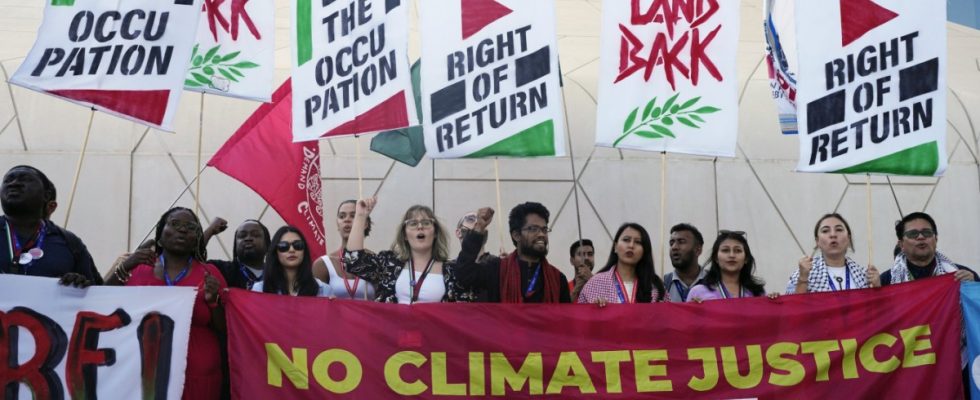Annalena Baerbock says she can’t choose which crises she has to deal with at the moment. “The crises overlap to a maximum,” says the German Foreign Minister. Which is why on Sunday morning she didn’t rush to the climate conference site in Dubai, but rather to a logistics hub for the World Food Program (WFP).
It’s about humanitarian aid and therefore specifically about the topic that hangs like a heavy shadow over the conference: the war in Gaza. “Most of the shelves were empty,” Baerbock says later when she returns to the conference grounds. “Because the need is so great in this region.”
Through “climate justice” they quickly end up with the Gaza war
At the climate summit, this need has long since developed its own dynamic: it is dividing the climate protection groups. Over the years they have built the Climate Action Network, an international network of more than 1,800 environmental, development and climate groups. The network, or CAN for short, has been effective for years at putting pressure on one delegation and another – even by publicly shaming them. But this year CAN is primarily concerned with itself. And the reason for this lies in the Gaza conflict, a good 2,000 kilometers from Dubai.
One of CAN’s most powerful resources is its daily awards ceremony, the “Fossil of the Day”. Every evening it is awarded to states that are particularly slow in the negotiations. Actually a funny show, led by a presenter with a bowler hat on his head and a skeleton costume. First prize last Friday: Israel. Not because of his climate policy, but because of Gaza. “Let’s be clear: There is no climate justice without human rights,” the moderator read. “Climate justice” is the intellectual bridge that leads directly to the Gaza war, especially for left-wing groups.
German environmental groups are also members of the European branch of CAN, such as BUND, Greenpeace, WWF, Germanwatch – they all voted against unilaterally pillorying Israel. At least it was still possible to make the formulation of the price statement as balanced as possible – with empathy for civilians in both Gaza and Israel. This was not originally planned.
The climate movement is divided and disjointed
“The international climate movement is increasingly divided on this issue,” says Kai Niebert, head of the German Nature Conservation Association. It is the umbrella organization of German environmental associations. But a climate conference is the wrong place for this protest. “This discussion completely distracts from what this is actually about.” Instead, it ties up the forces of environmental groups who actually want to achieve something for the climate.
The dispute had already begun before the climate conference. Demands had become louder within the CAN for every statement to contain the words “End settler colonialism! End climate colonialism!” to complete. This idea was also rejected by an alliance of environmental groups, including the German ones.
Even before the conference, Jewish and Muslim climate activists from Germany had one joint statement drawn up in which they warn against forgetting climate protection because of the conflict over Gaza. “Right now, we all need a climate movement that does not contribute to division and harm our common cause through one-sided blame,” it says. But the appeal obviously didn’t reach Dubai.
On Saturday, for example, a demonstration took place on the conference grounds, speakers accused Israel of colonialism. “No climate justice on occupied land,” says posters. On Sunday it’s the presenter’s turn again in the skeleton costume, and Israel gets the prize again. This time the German groups were unable to avert anything. Israel, he says, is “engaging in genocide and ethnic cleansing.” This leaves German environmental groups speechless. “I cannot support these statements,” says Germanwatch boss Christoph Bals.

